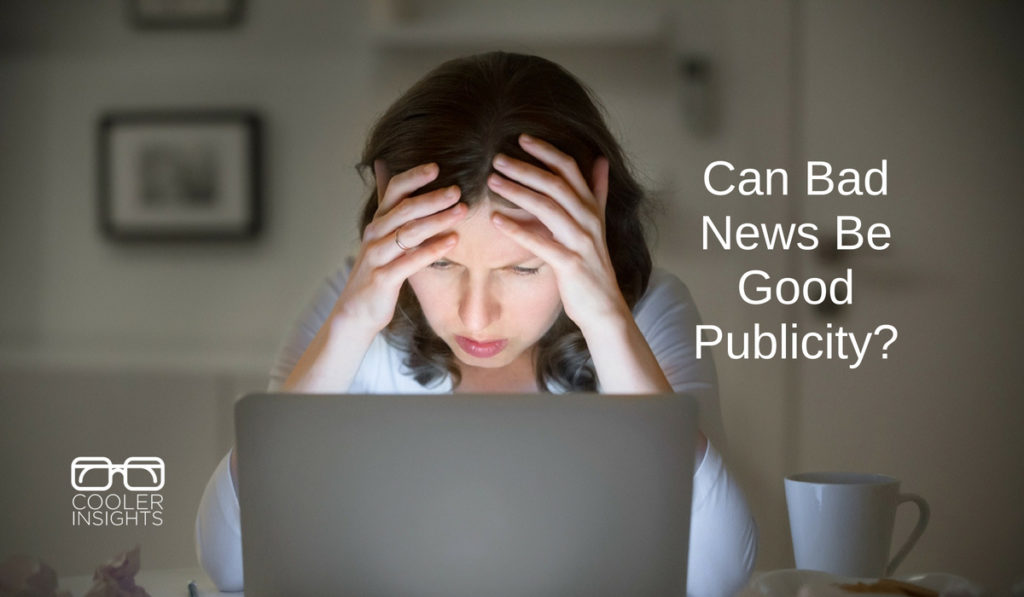
Everybody loves the limelight. Well, almost everyone.
Done well, publicity can help you to gain significant brand awareness, trigger customer interest, and build your corporate reputation. Media coverage on a respected national or trade publication can also help you to achieve legitimacy for your brand.
However, what happens when your business is cast in a damning light by the media? Does it mean that its the end of the world for your company or brand if it “goes viral” for the wrong reasons?
After all, you’re probably familiar with how crises (such as this) can snowball to gargantuan dimensions on social media.
Before we discuss this topic further, let us first look at examples of incidents and crises which may cause “bad news.”
Triggers of Negative News
Before we go deeper into this topic, let us look at some of the common organisational issues which may trigger negative online news.
Customer Service Snafus
These are a dime a dozen. Often, they happen due to mismanaged customer expectations, poor staff training, and the lack of a service culture.
When things blow up online, a seemingly run-of-the-mill encounter in a retail or F&B establishment may end up getting your brand name in flames. Over-assertive shop owners may end up being labeled as cyber-bullies (or the reverse may happen.)
Staff Scandals
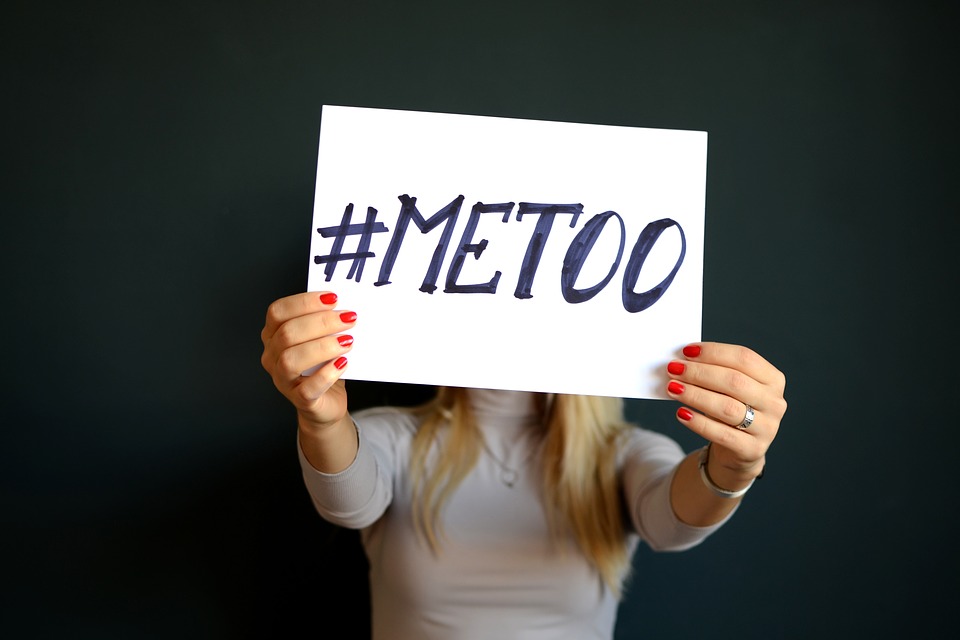
Depending on the nature of your brand, employee shenanigans may dent your reputation and drive away potential customers. This is especially true for industries where high standards in integrity and morality are demanded.
However, not all staff misdemeanors are fatal. Have a look at these examples and see if you can guess what these incidents were:
- Your CEO was involved in an affair with an attractive sales manager
- Your financial manager was caught doctoring the accounts
- A restaurant employee was filmed on video inserting cheese into his nostrils
- Senior executives in your firm are accused of sexual harassment
(The answers are in the links.)
Insensitive Public Remarks
Occasionally, commonsense eludes us when we are swept in a flood of opportunistic emotions.
Take for example this tweet by fashion designer Kenneth Cole soon after the Egypt uprisings back in 2011.
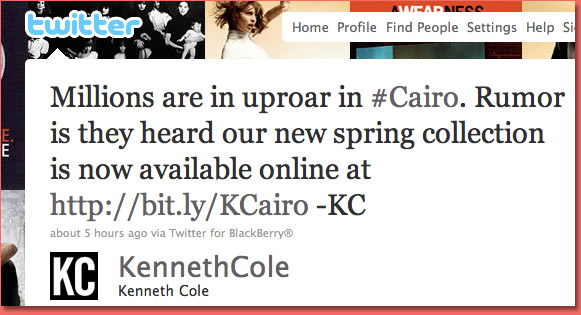
While Cole has pretty much recovered from the incident, the incident has left an indelible mark on the designer brand.
Industrial/Political Espionage
Ian Fleming’s fictional character James Bond was the spy whom everybody loved. However, real-life spies often inflict substantial damage to their victims and are usually less cherished.
Consider the case of Wikileaks founder Julian Assange. Famed for leaking high security files from governments such as the infamous Collateral Murder video, his database hacking actions generated a lot of embarrassment for politicians around the world. It also resulted in numerous jurisdictions tightening Internet security measures.
Corporate Sabotage
Sometimes, competitors to your business may choose to expose you in a negative light, like the feud between Zam Zam and Victory restaurants where the former accused the latter of conducting “black magic.”
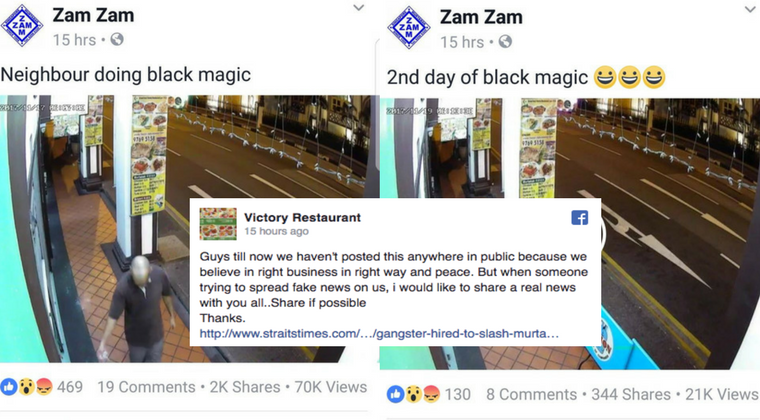
Courtesy of Mothership
When such incidents occur, virality often results as online citizens love to watch fights between warring shop owners. Such sagas are almost akin to a reality TV show, albeit with actual persons in real life situations.
Workplace Accidents
What happens if an oil rig blows up?
By now, everybody would be familiar with BP’s Deep Horizon case, which resulted in the resignation of then CEO Tony Hayward and even spawned a Hollywood movie.
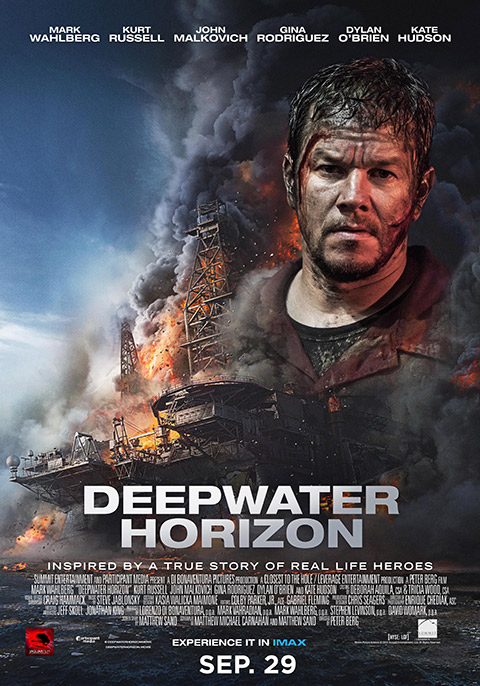
While the outcomes of Deep Horizon was catastrophic for BP’s reputation, most workplace incidents do not leave such a long and lasting impact.
Natural Disasters
Few and far between (thank goodness), natural disasters can negatively impact your organisation’s financial and reputational bottom lines.
Although it has been over seven years since the 2011 Tohoku Earthquake and tsunami in Japan, the company managing the nuclear plant in Fukushima is still reeling from its aftermath.
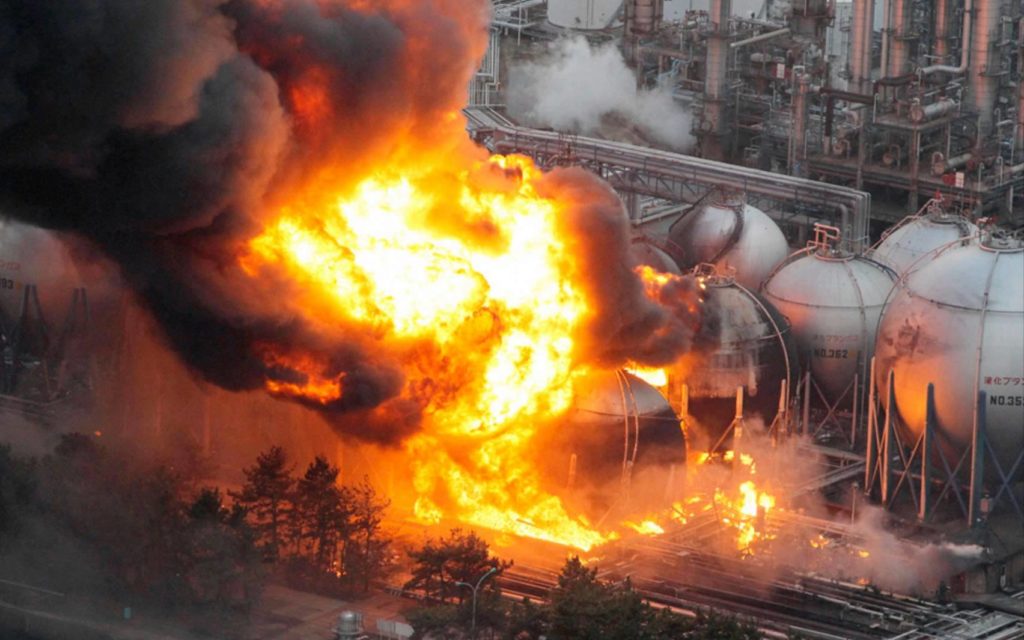
Till today, the Tokyo Electric Power Company (Tepco) is still salvaging the wreckage from the incident while trying to manage public fallout over its failure to be transparent during the initial period after the disaster.
Acts of Terrorism
Last, but certainly not least, acts of terrorism can greatly dent a place’s attractiveness. 17 years after the 9/11 incident occurring at New York Twin Towers, the world has changed how it manages airport security measures, resulting in long queues and hassles for air travelers everywhere.
When Bad News may be Good News
OK, all of the above incidents and crises certainly sound like things which you wouldn’t wish upon your worst enemy.
However, does all negative publicity result in irreversible damage to organisations?
In a study conducted by Jonah Berger of Wharton and Alan T Sorensen and Scott J Rasmussen of Stanford, it was discovered that bad news may sometimes have good outcomes.
Consider the following:
- Although the movie Borat made fun of Kazakhstan, Hotels.com reported that the number of requests it received for the country skyrocketed to 300 percent after the movie was released.
- Michael Jackson’s music sales went up when he was reported in the news for child molestation or dangling his child over a balcony.
- Rebecca Black‘s famously viral (and bad) Friday song actually helped her to be noticed. Today, she is a successful recording artiste at 19 years of age.
- A $60-a-bottle Tuscan wine enjoyed a 5% spike in sales when a well-known online reviewer called its aroma “stinky socks.”
From the above examples and numerous others, we could perhaps conclude the following about bad media coverage:
- If you are a newbie in the industry (eg Rebecca Black when she first sang “Friday” at 13), virtually any kind of publicity may be good – even negative ones. The professors’ study above further revealed that bad reviews may actually improve book sales by 45 percent.
- If you are established, negative reviews and coverage (eg book reviews or movie reviews) is normally bad.
- If you are a known brand, but have been inactive on the media scene, a spot of bad press may sometimes trigger positive outcomes.
Mastering Bad News (and Controversy)
Much as we loathe to admit it, human beings simply love negative news.
According to this article, media studies have shown that bad news far outweighs good news by as much as 17 negative news reports for every one good news report!
Negative virality often trumps positive virality. This is why US President Donald Trump continues to remain as one of the top items on Google searches, trending Tweets, and Facebook shares despite being in office for over a year.

In the world of social media, influencers recognise the power of trolling others to trigger virality.
This is reflected in incidents such as the recent Elle Darby vs White Moose Cafe saga, where Paul Stenson of the White Moose Cafe in Dublin outed the email request of YouTube influencer Elle Darby and subsequently banned all bloggers from his establishment. As an influencer himself, Stenson is probably aware that his actions would trigger both positive and negative reviews while raising publicity that no amount of advertising can.

Elle Darby (courtesy of YouTube)
What Should You Do?
OK, so you’ve read all about how bad news can happen, when bad news may have good outcomes, and occasions where generating “bad news” may actually get you ahead.
What should you then do when the proverbial sh*t hits the fence? Consider this step-by-step guide:
- Before any disaster occurs, you ought to have already fostered a strong online community of supporters. If you’ve been generous with them over the years, they may come to your defence when incidents occur.
- Next, find a way to resolve the incident as soon as possible. If another party is aggrieved (eg an angry customer), investigate the series of events which triggered the reaction and find a way to amicably settle this (best in private) as soon as possible.
- If the fault does not lie with you, you need to present your side of the story on your own public channels. This is where a frequently updated blog (which can be a page on your website), Facebook page and Twitter account are helpful.
- Monitor public interest over the incident. See if it warrants an ongoing response, or if you are better off just lying low.
- Consider the credibility of the parties spreading the hostility. If they are perceived to be highly credible, a robust response inf your defence may be needed. However, those with poor credibility (especially amongst your customers) may be better ignored.
- Assess the impact of the incident and how potentially far-reaching it may be. In the digital age, the average lifespan of negative news is far shorter than what most of us imagine it to be.
- Try to close-off the incident or crisis in a positive light. Take advantage of the immediate public and media interest to address the issues head-on. Announce the corrective measures that you’ll implement in the future, and share these on all your channels. You should also arrange for a media briefing.
Have you encountered your share of bad news? What actions did you take and how effective were they?

Your post is very unique and reliable information for all readers so write more on same topic and share with us your info.. Thanks